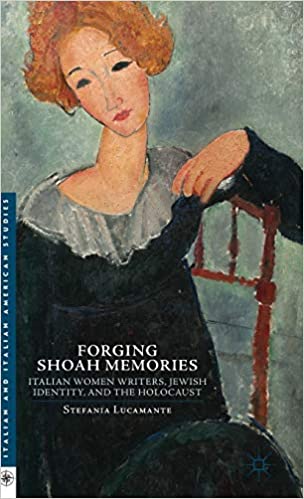File:2014 Lucamante.jpg
2014_Lucamante.jpg (304 × 499 pixels, file size: 27 KB, MIME type: image/jpeg)
{en} Stefania Lucamante. Forging Shoah Memories: Italian Women Writers, Jewish Identity, and the Holocaust.
Abstract
Examines works by seven female writers - both Italian and those who chose Italian as their linguistic vehicle - who represented the Holocaust in their works. Two of them, the survivors Liana Millu and Edith Bruck, tried to render their camp experience in their novels. Three relatively younger writers - Rosetta Loy, Lia Levi, and Giacoma Limentani - based partly on their wartime impressions, focus on Jewish pre-deportation experiences in Rome and elsewhere, in particular on the impact of the Race Laws of 1938 on the Jews, as well as on the Roman roundup of October 1943. Dwells on writings by Elsa Morante, whose novel "La Storia" (1974) is considered one of the most important novels on the Holocaust, and on a writer of the postwar generation, German-born Helena Janeczek. The works by these writers present various degrees of transition from literature of testimony (such as memoirs) to fiction; they show the tragedy of multiple "otherness" - as a Jew and as a woman, and in the Nazi camps also as an Italian.
Contents
Part 1: Survival and representation of the Shoah in Italy -- 1 The Italian Shoah: reception and representation -- 2 Not only memory: narrating the camp between reality and fiction -- 3 The power of dignity, or "writers out of necessity": the case of Liana Millu and Edith Bruck -- 4 Inside the D and out of the ghetto with the Bambine of Rome: Lia Levi, Rosetta Loy, and Giacoma Limentani -- Part 2: "The world must be the writer's concern": La Storia according to Elsa Morante -- 5 La Lacrime: Morante and her critics -- 6 History and stories: historical novels and the danger if disintegration -- Part 3: Helena Janeczek: understanding Jewish memory from Lezioni di tenebra to Le rondini di Montecassino -- 7 The burden of memory: Lezioni di tenebra -- 8 Tips against "numbness" for new generations: for a collective useful memory of the Shoah and a global network: Janeczek's postcolonial thought -- Conclusions.
File history
Click on a date/time to view the file as it appeared at that time.
| Date/Time | Thumbnail | Dimensions | User | Comment | |
|---|---|---|---|---|---|
| current | 23:05, 8 February 2022 |  | 304 × 499 (27 KB) | Gabriele Boccaccini (talk | contribs) |
You cannot overwrite this file.
File usage
There are no pages that use this file.
- Italian Jewish Studies--2010s
- Italian Jewish Studies--Italian
- Women, Jews Italy (subject)
- Women, Jews Italy, Criticism (subject)
- Holocaust, Italy (subject)
- Millu, Liana (1914-2015)
- Bruck, Edith (b.1932)
- Limentani, Giacoma (1927-2018)
- Levi, Lia (b.1931)
- Loy, Rosetta (b.1931)
- Morante, Elsa (1912-1985)
- Janeczek, Helena (b.1964)
